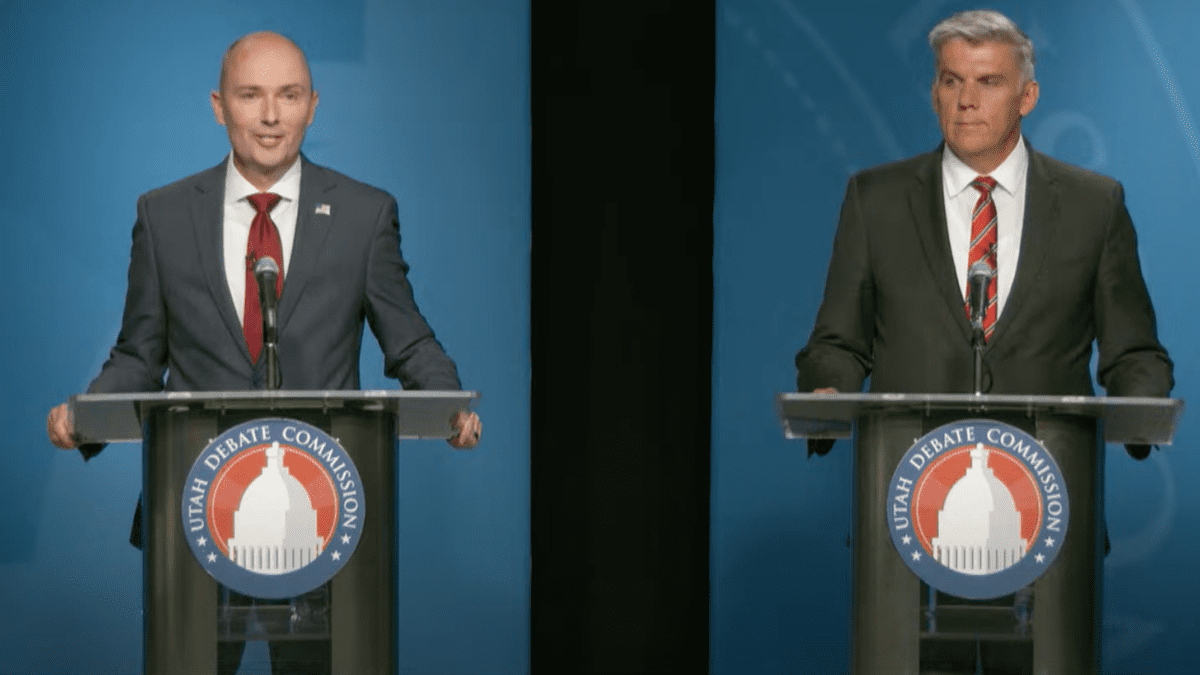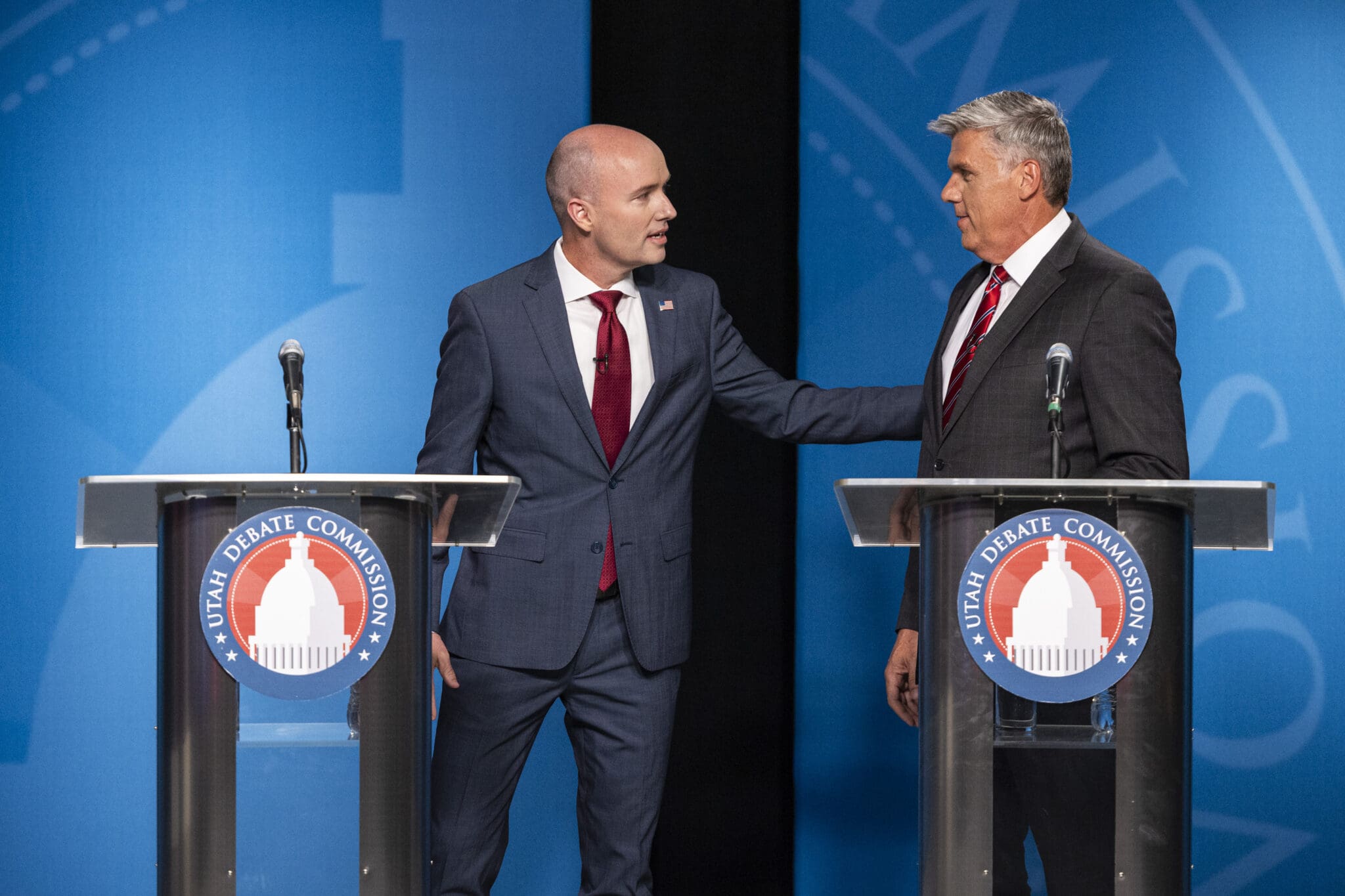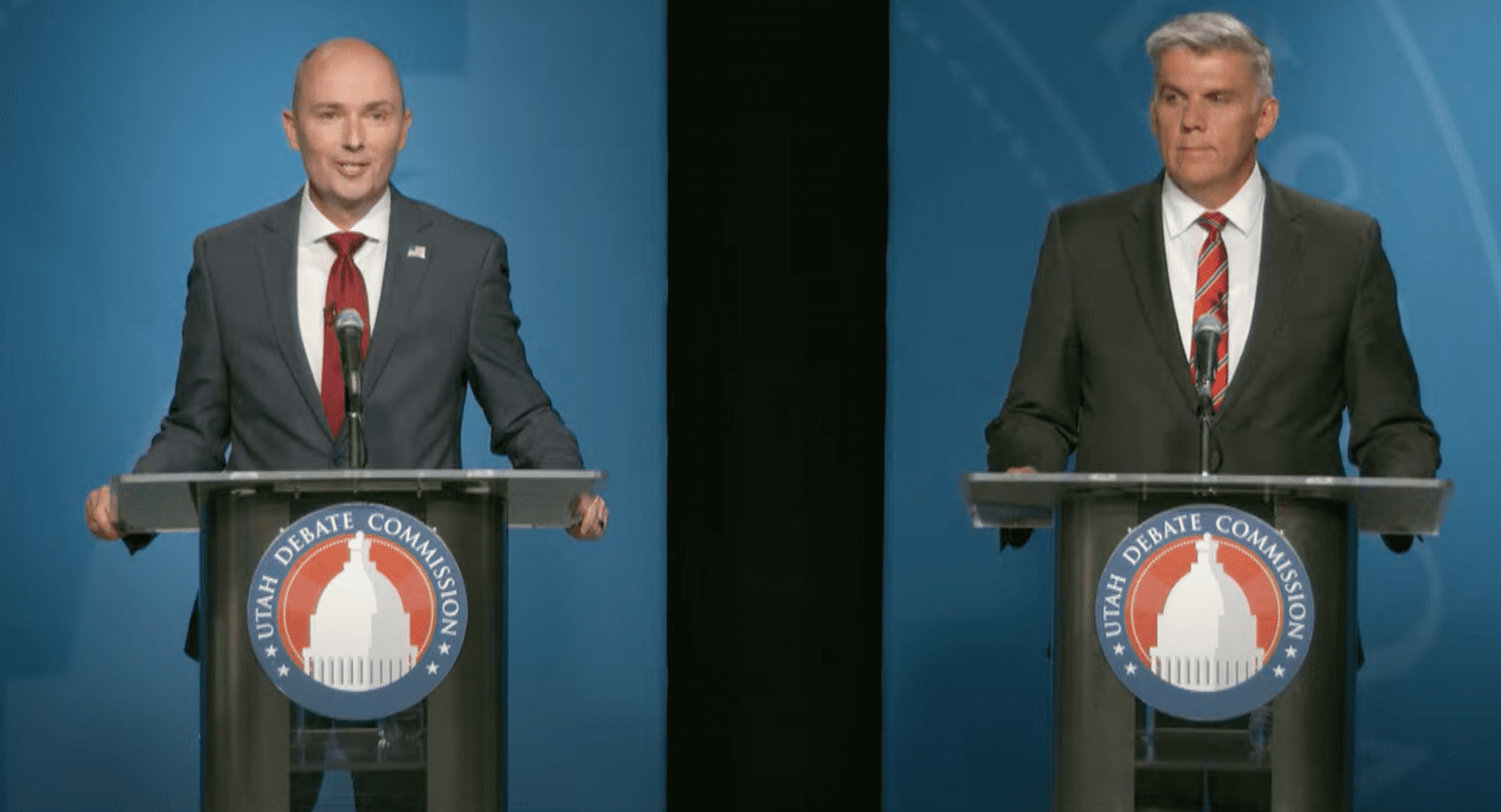Politics
After gubernatorial primary loss, Lyman sues for records that allowed Cox to get on ballot

Governor Spencer Cox and State Rep. Phil Lyman at the 2024 gubernatorial Republican debate on Tuesday, June 11. Photo: Utah Debate Commission.
By: Kyle Dunphey, Utah News Dispatch
Gubernatorial candidate Phil Lyman and his running mate, Natalie Clawson, are suing state election officials in an effort to review records that allowed Utah Gov. Spencer Cox to be on the ballot for the Republican primary election.
Endorsed by former President Donald Trump, Lyman fell about 38,000 votes short in his attempt to unseat Cox from the right. And, like the former president did with the last election, Lyman has questioned the validity of Utah’s primary results, refusing to concede, calling for an audit and filing open records requests to inspect the steps Cox took to get on the ballot.
That records request is at the heart of Lyman’s complaint filed last week in Utah’s 3rd District Court in Salt Lake County. Utah law allows candidates two avenues to get on the ballot — they can seek nomination by GOP delegates at the Utah Republican Party’s convention, or they can collect enough signatures from eligible primary voters.
Cox chose the signature route, and now Lyman wants to get his hands on “unredacted nominating petitions, Signature Packets, and other voter registration information sufficient to allow,” according to the complaint. Lyman’s campaign hopes those records will allow them to verify and possibly challenge the signatures that were submitted on behalf of the Cox campaign.
The Cox campaign responded to the lawsuit in a statement on Monday, telling Utah News Dispatch they are confident the court will rule in their favor.
“Phil lost with Utah Republican voters, and it wasn’t close. He’s already lost once with a judge during this election cycle, and he’ll lose again with this lawsuit and the others he says he intends to file,” said Matt Lusty, the governor’s campaign spokesman, pointing to Lyman’s failed bid to find his original choice for a running mate eligible for the ballot.
Henderson’s office declined to comment on active litigation. But in a July 3 statement, the same day the complaint was filed, Henderson sent a letter to Utah’s county clerks reminding them that “election related materials” are not considered public records.
The lawsuit also seeks to obtain signature gathering records from Brad Wilson and Derek Brown’s campaign — Wilson lost his bid for U.S. Senate, while Brown won the GOP primary for attorney general.
Calling it a “lawsuit about the public’s right to transparency and the integrity of the signature-gathering process for primary elections in Utah,” the complaint names Utah Lt. Gov. Deidre Henderson, the top election official in the state, director of elections Ryan Cowley, and Mallory Underwood, office administrator for the lieutenant governor.
“Confidence in our elections is crucial. Continued obstruction by Lt. Gov. Henderson, which makes it impossible to independently verify Cox/Henderson’s signature packets, does nothing to promote transparency and faith in our elections. We believe this action is essential to ensure the integrity of this important process,” Lyman said in a statement posted to his X account.
The complaint references Gathering Inc., a signature gathering company that was used by the Cox campaign and state Sen. Don Ipson, R-St. George. The Washington County attorney found issues with the signatures gathered for Ipson’s campaign, which according to the complaint led to about 600 being invalidated.
Ipson holds a 444 vote lead over his GOP challenger Chad E. Bennion, according to the latest results.
After “learning of the potential signature-gathering issues” with Ipson’s campaign, the Lyman and Clawson campaign filed a public records request to see the signature packets for Cox, as well as Brown and Wilson.
The lieutenant governor’s office produced a redacted version of the signature packets, according to the complaint, which prevents “any other campaign or individual from challenging Signature Packets submitted by another candidate for state or local office.”
“To ensure a fair and transparent process, this information must be disclosed to other candidates or political campaigns,” court documents read.
There are currently no hearings set for Lyman’s lawsuit.
The court challenge is the latest in Lyman’s tirade against Cox and the Utah election law. After the two debated in June, Lyman declined to say he would accept the results, instead telling reporters he would “be checking the results of the election … I will be checking the statistical analysis that should be available after an election.”
Lyman has also criticized SB54, which Utah lawmakers passed in 2014, allowing candidates to collect signatures rather than solely rely on the party’s convention to get to the primary ballot. In Utah and elsewhere, that process “has been rife with issues of fraud, deception, and forgery,” the complaint filed last week reads.
Utah election officials, including Henderson, maintain that the state’s elections are fair and secure.
Utah “leads the nation in elections administration by protecting voters’ constitutional right to the ballot in ways that reduce barriers, while also strengthening security measures to ensure each Utahn knows that their vote is counted securely, accurately and anonymously,” Henderson said at an election trust forum at Utah Valley University in the spring.


















